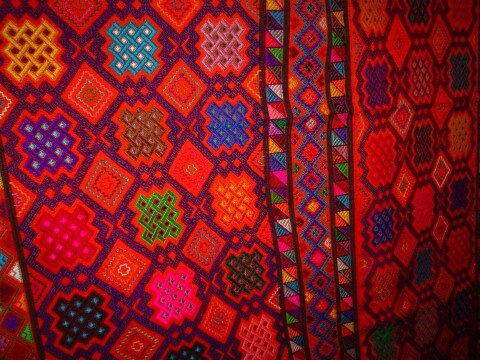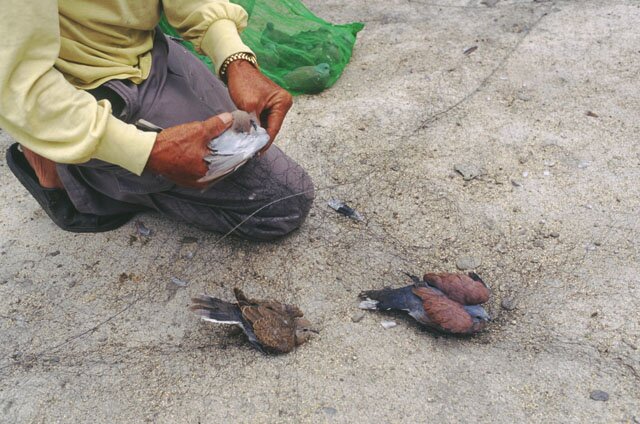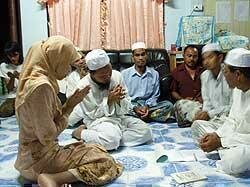BROWSE COUNTRIES/ TERRITORIES
Sleeping on the sidewalk in Jerusalem
Under the shade of an olive tree, an evicted Palestinian family is caught in a strange stand-off with the Jewish settlers who have taken over their home.

It is the fifth night the Hannouns and their small band of stubborn, steadfast supporters are sleeping out on the pavement, opposite what used to be their house. It is getting more difficult. Yesterday evening, the wind was relentless. In summer, the sun shines mercilessly on Jerusalem; but after sundown, the cold takes over and for the last two nights, everyone was wrapped in blankets by eight.
The tension is palpable. Neither the Hannoun camp nor the new Jewish occupants of their former home are at ease. There is constant police presence. Sometimes police vans drive up and do a turnabout in front of the Hannoun camp. Or they simply slow down as they pass within arm's length.

The Israeli police keep watch 24 hours outside the Hannoun's former home.
The Jewish settlers took all of one hour to move into the Hannoun house on Sunday. Before dawn that morning, more than 500 armed policemen descended on the three houses in the residential neighbourhood of Sheikh Jarrah, the part of the predominantly Arab East Jerusalem that borders the ultra-Orthodox Jewish district of Mea Shearim, where residents still don Polish traditional dress from the 19th century and discourage outsiders from visiting or passing through.
Within minutes, the Hannoun family was out on the sidewalk. The police systematically entered the two adjoining houses belonging to an extended part of the Hannoun family, expelling everyone, including a 68-year-old grandaunt who was recovering from eye surgery and due to have her stitches taken out later that day. The Israeli police ordered her an ambulance, but she was too distressed to allow herself to be separated from her family. So there she remained on the sidewalk, behind a cordon, as the police emptied the three houses of furniture, and drove them away to the local police station for the family to claim.
The Hannouns have been living on the pavement ever since. This is their living room, where they sit and serve tea to visiting diplomats, international officials, journalists, locals, and tourists, throughout the day. Maher, the head of one of the three nuclear families that make up the Hannouns, is tireless in telling his story over and over again to anyone and everyone who comes.
%20explains%20the%20situation%20to%20visiting%20foreigners.%20In%20the%20background%20is%20the%20house%20from%20which%20he%20was%20evicted.jpg)
Maher Hannoun (front row, in the middle) explains the situation to visiting foreigners. In the background is the house from which he was evicted.
Ever since he knew he was going to be evicted months ago, he has been pleading his case to the foreign missions here, and in the local and foreign media. According to his wife Nadia, he even repeats it in his sleep – not in his native Arabic, but in English, the language he uses to explain his plight to the foreigners who come by.
This is also their dining room. Neighbours and relatives bring bread, hummous and other local dishes at meal times, and whoever is there breaks brea
d together, the Middle Eastern way. At night, this same spot becomes their bedroom. It barely fits the eight mattresses that, by day, function as couches and, by night, makeshift beds. Pillows are a bit of a luxury – there are two of them.

This is the patch of sidewalk where the Hannouns have now set up home, with internationals and locals spending the night to express solidarity with the family, watched by the police.
Across the road, the Jewish settlers keep a low profile, declining requests by the media to interview them. They enter and exit their new home by the entrance furthest from the Hannoun camp, aware that less than a minute's walk away are infuriated and resentful people. Those who come and go are mostly teenage boys, no older than 16, with their yarmulkes on their heads and ringlets of hair swinging by their ears. It never takes long for someone inside to open the door for them, and to close it promptly after. Occasionally, one peeks through the gates, looking at the other side.

Throughout the day, young Jewish settlers visit the Hannouns' former house.
Thus is the situation that the two groups find themselves in, with an uneasy peace held only by the police’s presence and a determined effort by the Hannouns to keep it civil. Frustration is evident. A few times, someone from the Hannoun side crossed the boundary to push over the police-erected metal barriers. Soon after though, someone else from the same side would go over to put the barriers back in place.
The legal tussle over the Hannoun property
The Hannouns have proof that the Turkish government has found no corresponding document to the Ottoman-era deed that forms the Jewish claim to the land. This undermines Israel’s argument that Jews owned this land during the 400 years when the Ottoman empire controlled Jerusalem, before the British took over in 1917. Unfortunately for the Hannouns, they were only able to get this proof after the deadline set by the courts. They missed it by two years.
If the Gaza war had broken out three years before, the story might have turned out differently. Turkish Prime Minister Recip Tayyip Erdogan would have fallen out with Israeli president Shimon Peres sooner, the traditionally cordial relations between their two countries soured earlier, and Ankara taken a shorter time to accede to the Hannouns’ lawyer’s request to verify the origin of the Ottoman deed.
“Regrettable” is the choice of words chosen by the “international community” in describing this situation. The British consul said it a month ago, when he addressed a press conference here on the issue. US Secretary of State Hillary Clinton also used it, when the Americans finally made a statement two days after the eviction.

Hannoun supporters camped out on the pavement across the house
Maher's hope is buoyed by the foreign missions stationed here in East Jerusalem. The international community, he believes, will do something to pressure or punish Israel into giving him his house back.
He reminds me that his house is less than 50 meters across from where we are sitting. The Red Cross and other similar organisations have offered him tents, but he has refused them. For too long, he tells me, the Israeli displacement of Palestinians has been resolved by the putting them first into tents and then in refugee camps.
His solution to the problem is simple: give him back the home he was born in, where his family has lived for 53 years since the government of Jordan – which had then controlled East Jerusalem – built it to accommodate Palestinian refugees, when their villages were lost to the creation of Israel in 1948.
He has lost all legal recourse, and it would seem like a losing battle, if not for two reasons.
Firstly, in two months, a minute team of international volunteers and local friends has managed to raise the profile of the eviction, so much so that Clinton refers to this small Jerusalem neighbourhood by name. Sweden, the current president of the European Union, summoned the Israeli ambassador, as did Washington, for a ticking off – specifically on this case.
These families evicted comprise no more than 70, and have no power of influence. Yet, if faith is believing in what you cannot see, perhaps that which they have in Barack Obama and “Yes, we can!” has paid off.
A letter penned by Maher to the US President, and sent to the US Consulate in Jerusalem, seemed to have meandered through the American bureaucracy to (or at least close to) its intended recipient, for the administration to sit up and take notice.
Secondly, even if US pressure on the Israeli government fails to work, there is still hope, because of the Israeli people. The country, which touts itself as a democracy, is accountable to them. Organisations like Rabbis for Human Rights have been raising awareness about the Hannouns; and Maher does not neglect to note just how ordinary Israelis, many from Tel Aviv and Haifa, have come down to express their support for him.
In fact, when the police detained people for trying to visit the families after the raid, one of those arrested was the sister-in-law of Israel's right-wing Prime Minister Benjamin Netanyahu, Ofra Ben-Artzi.
How will all this play out in the end?
Maher believes there remains a way for him to get his house back. He says he will not walk away from this without a fight, because he cannot be throwing his three children into the streets.
From the sidewalk across his former home, he continues to hope. After all, with his house gone and nowhere else to go, he has precious little in the way of alternatives.
Story and photos by Dan-Chyi Chua
< BACK to previous post THE CHINESE-ARAB CONNECTION
< BACK to other stories in FROM JERUSALEM TO THE WEST BANK
Login or Register
- Asian Dynasties and History
- Conservation of the Environment
- Definition: Culture
- Economy and Economics
- Food and Recipe
- Geopolitics and Strategic Relations
- Health and Body
- Of Government and Politics
- Religion and Practices
- Social Injustices and Poverty Report
- Society, Class and Division
- Unrest, Conflicts and Wars































 Another Point
Another Point From Jerusalem to the West Bank
From Jerusalem to the West Bank
Comments
Post new comment